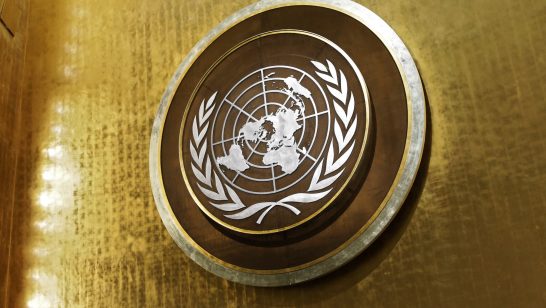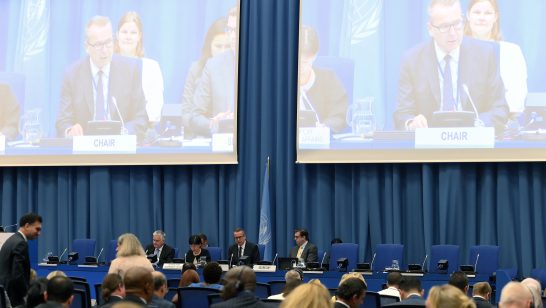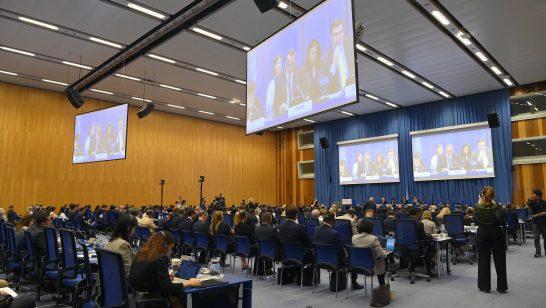
The recent Review Conference of the Nuclear Non-Proliferation Treaty (NPT) has shown how constructive efforts to advance nuclear disarmament can be easily compromised by political polarisation. To overcome this dilemma, states should explore more common ground in less politically contested areas. In this context, the current multilateral initiatives in nuclear disarmament verification (NDV) offer a suitable platform for states to establish a baseline of cooperation. In particular, the technical, un-politicised and collaborative setup of NDV forums has the unique potential to generate consent on conceptual issues and objectives among a vast number of states, offering a path towards more effective policymaking in the NPT cycle.
The technical, un-politicised and collaborative setup of NDV forums has the unique potential to generate consent on conceptual issues and objectives among a vast number of states, offering a path towards more effective policymaking in the NPT cycle. Kim Westerich-Fellner
Polarisation in NPT politics
‘Yes – but not now’ is the likely answer echoing through the walls of ministries these days when questions about nuclear disarmament are raised. With multiple crises surging over Eastern Europe, the Middle East, and the Indo-Pacific, NATO-aligned countries appear to be more inclined to strengthen their nuclear deterrence, than to make advances in nuclear disarmament. At the same time, non-nuclear weapon states have been increasingly vocal in expressing their resentment over the perceived lack of commitment of nuclear weapon states to Article VI (the disarmament pillar) of the NPT.
Unsurprisingly, the expectations for the 10th NPT Review Conference were modest. And yet, in what many perceived as an effort to strengthen international treaties in the face of global turmoil, non-nuclear weapon states were ready to make significant concessions for a final agreement. Ultimately, their efforts failed over a seemingly neglectable point of contention when Russia objected to the language in specific text passages dealing with the Zaporizhzhya nuclear power plant. Polarisation among states had once again undermined NPT negotiations.
One year later, as states enter the new NPT cycle, their greatest challenge is to set aside these political disputes and generate constructive debates. A first step in this regard was made by establishing a Working Group on ‘further strengthening the review process of the Treaty’. To fortify this effort, states should bring one of the least-contested and central aspects of nuclear disarmament to the centre stage: verification.
As past efforts in nuclear disarmament verification were mostly bilateral and exclusive to nuclear weapon states, the foundation of IPNDV and other initiatives brings a new multilateral spirit to the stage. Kim Westerich-Fellner
A new spirit in nuclear disarmament verification
NDV is the process of gathering and analysing information to assess whether a Party is complying with the provisions of a specific treaty or agreement. While verification mechanisms have been an integral part of the international non-proliferation regime for decades, their application in nuclear arms control and disarmament agreements has been much more tentative, as concerns about revealing sensitive information on weapon design prevailed.
The ratification of the New START treaty constituted a great success in the world of NDV, as for the first time in the history of U.S.-Russian nuclear arms control, both states committed to extensive verification mechanisms, including satellite monitoring and onsite inspections. However, the intrusiveness and scope of these mechanisms remained limited to verifying the number of actively deployed nuclear weapon systems, leaving the vast number of stockpiles untouched.
Driven by the realisation that deeper cuts in nuclear arsenals would require a much more comprehensive verification regime, new initiatives have emerged in recent years, comprising various stakeholders and experts from multiple countries. Among them, the International Partnership on Nuclear Disarmament Verification (IPNDV) and the Quad Initiative advanced all-encompassing approaches covering technical, political, and social dimensions. In these forums, states put aside any political disagreements, in favour of collaborating to identify critical gaps in the verification process. For instance, in recent years, these forums have allowed states to work together to compile and advance the technology needed to verify whether or not a nuclear warhead has been dismantled, without revealing sensitive details about its design, which could compromise the national security of nuclear-armed states.
Groups like the GGE can be instrumental in exploring the realistic range of actions for promoting NDV before they are negotiated at the Review Conference. Kim Westerich-Fellner
As past efforts in nuclear disarmament verification were mostly bilateral and exclusive to nuclear weapon states, the foundation of IPNDV and other initiatives brings a new multilateral spirit to the stage, a spirit that can create sustainable bonds between both nuclear and non-nuclear weapon states through open-minded collaborations and capacity building. Various exercises conducted by these initiatives, among them the Franco-German-led NuDiVe exercises, demonstrate the practical feasibility of their newly developed verification procedures.
Setting the baseline
Apart from their inherent success, the work of these initiatives also provides some value for NPT negotiations. For instance, efforts to strengthen verification are widely supported amongst NPT member states. The recently created multilateral platforms, therefore, can serve as an opportunity for states to explore more common ground, even as they diverge politically. As IPNDV and other initiatives emphasise a comprehensive yet technical approach to verification, they pave the way to reasonable policymaking while keeping politics mostly out of the equation – such a balancing act may prove to be the right formula for obtaining broad consent among states, including Russia, in future NPT negotiations.
Similarly, states might be able to agree more efficiently on common phrasings and definitions in the NPT Review process. In the first Preparatory Committee meeting of the new NPT Review cycle this year, much time was consumed by disputes about wording and definitions. If such definitions were already agreed upon by key NPT member states in the context of other forums, more substantial decisions could be made. One model forum could be the U.N. Group of Governmental Experts on Nuclear Disarmament Verification (GGE-NDV). The group has exceptional relevance as it comprises all five NPT nuclear weapon states, along with various non-nuclear weapon states. Only this year, the GGE successfully adopted a final report, with consensus on a working definition and several conceptual aspects of NDV. Groups like the GGE can thus be instrumental in exploring the realistic range of actions for promoting NDV before they are negotiated at the Review Conference.
NPT member states engaged in NDV initiatives should be encouraged to integrate conceptual ideas and definitions into their national statements. Kim Westerich-Fellner
Recommendations for the chair of the NPT Preparatory Committee
To transform the work of NDV groups into actionable options for the next Preparatory Committee meeting in 2024, the chair could follow three steps of action. First, the chair should recommend that the U.N. Secretary General establish a new GGE to further advance recent work on forming a Group of Scientific and Technical Experts. This would sustain multilateral efforts in NDV.
Second, NPT member states engaged in NDV initiatives should be encouraged to integrate conceptual ideas and definitions into their national statements. In addition, the chair should create a Working Group on developing definitions, objectives, and purposes for NDV, following the successful lead of the recent Working Group on ‘further strengthening the review process of the Treaty’. Building on the report of the GGE, such a group could identify common goals with a realistic chance of reaching a consensus in the NPT Review Conference in 2026, thereby creating a baseline.
Third, beyond such a baseline, the Quad and IPNDV initiatives should be encouraged to work in a more targeted manner towards the Preparatory Committee meetings. Among others, the initiatives should make proposals for comprehensive concepts and frameworks for NDV that the groups have developed and tested in realistic scenarios and exercises. This may include the acknowledgement of key techniques such as information barriers and systems-based approaches. While Russian support is not guaranteed, an agreement between Western nuclear weapon states and non-nuclear-weapon states is feasible and would still constitute a great success.
With no final agreement in two consecutive NPT Review Conferences, the trust of the international community in the effectiveness of NPT politics to achieve a world without nuclear weapons is at serious stake. Instead of projecting polarisation and controversy onto the debate, future negotiators need to embrace the consensual groundwork of multilateral forums. It is time for states to rediscover their common ground, and cease allowing inter-state political disputes to hinder their collaboration on important issues – depoliticising nuclear disarmament by following the lead of NDV initiatives could constitute a brave step towards a more cooperative multilateral world.
The opinions articulated above represent the views of the author(s) and do not necessarily reflect the position of the European Leadership Network or any of its members. The ELN’s aim is to encourage debates that will help develop Europe’s capacity to address the pressing foreign, defence, and security policy challenges of our time.
Image credit: Wikimedia Commons / U.S. Air Force



